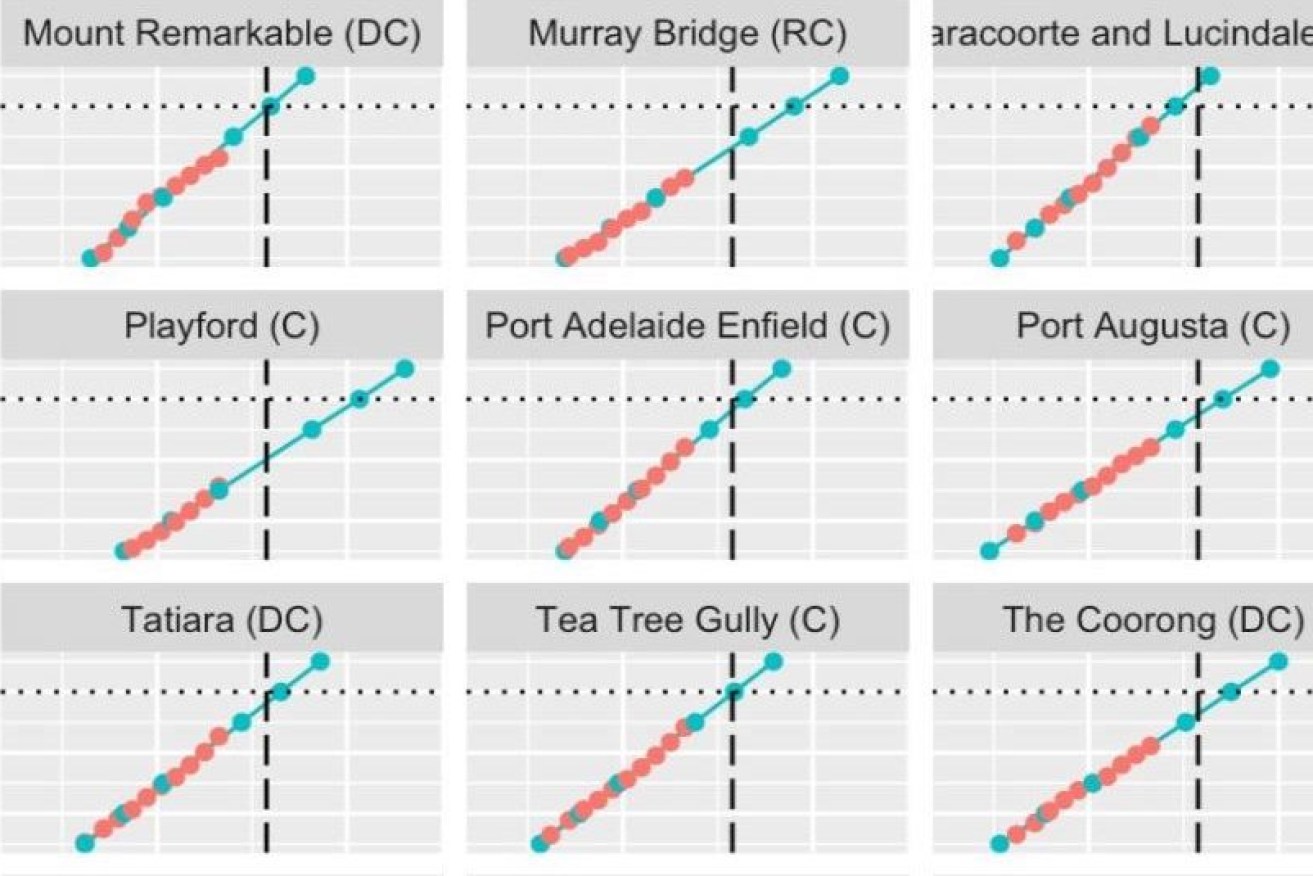Your views: on vaccination and population
Today, readers comment on the great divide in council area vax rates, and calls to reboot immigration.

Compilation of graphs showing when SA's LGAs are projected to hit 70, 80 and 90 per cent double-dose vaccination. The vertical dotted line represents November 23 (Graph: Ben Moretti).
Commenting on the story: South Australia’s vaccination divide revealed in five graphs
Interesting to see that the councils based on the Lower Eyre Peninsula – Port Lincoln, Cleve, Elliston, Ceduna etc and up to another five or six – aren’t even listed.
We’re terrified out here as the vaccination availability has only recently increased and many folks have not chosen to get the shot. I booked my first Pfizer vaccination in early August and had to wait til October 20 to get in. My second dose is due 23/11.
I’ve heard more than one story of folks driving 350kms to Whyalla just to get the vaccination as there was so little available here. That’s a full day off work and a very long drive for something that was supposedly ‘readily available’ across regional SA. – Jane Intini
Commenting on the story: Migration drop-off at heart of SA labour shortages
I have to disagree with this “endless growth at all costs “ model and the argument that we need large migration numbers.
I think this is a lazy government’s way of dealing with the issues at hand, and I get why they like it; more people means more (short term) housing construction, which is a large employer, more consumption and so forth.
However, eventually you overload the system, overload our environment, overload the draw on our natural resources of water etc and this whole house of cards will tumble … and what then?
The words that have gone missing from our economic vocabulary are sustainability and productivity. We need to rediscover these quickly if we are to have learnt anything from our Covid experience and to have a sustainable future, and we start by looking after our own and being better at what we do.
The fact that we can not find enough people for existing jobs in rural areas is more an indictment of our social services system than anything else.
We need to concentrate on doing more with what we have and doing it better for the benefit of our whole community, not just select parts of it. – Grant Petras
It would have been much more of a story if a company called Migration Solutions said that migration is the problem, and the solution is to train our own. – Sandra Kanck
It seems to me we are addicted to this line of ‘skilled’ migration. It’s obvious this is simply an excuse to import cheap, compliant labour with often questionable skills.
I’d like to see an adoption of the New Zealand adoption of no immigration. It sure hasn’t hurt their dollar and they seem to be doing ok.
With housing prices skyrocketing clearly putting our economy is serious debt, salaries stagnant, infrastructure not meeting demand, climate changing and resources being ever more consumed it seems we need to do as New Zealand are doing i.e. halting population growth and learning to live with what we have, sustainably.
We really do need to do way better for our children and for the planet. This growth and greed mantra simply has to stop. Surely it’s not a hard concept to grasp. – Peter Hayward
Oh, how I wish such economic reports actually responded to the reality of their context: our physical natural and built environments.
These reports are completely useless, naïve and self-serving. Where is the awareness of the full cost of more people in a region or location? Where is the awareness of the costs of infrastructure – of the supply of water, energy, transportation, communications… or bushfire planning (Mt Barker take note!). What about water supply in drought if – when – the Murray River dries up again, or micro-plastics pollution of water and food, loss of entire habitats and species extinction, waste disposal, hard surfaces run-off, or the health effects of heat islands on vulnerable people.
Why don’t economists realise that growth is not and cannot be a goal of our society? What about resurrecting a proper government-run TAFE as a training institution serving our regions properly, instead of the demonstrably false “efficiency” of private providers? What about making our universities survive on local education and research needs? Our local drying warming climate is not because of coal and oil use per se, it has been allowed to occur because governments and some businesses have actively promoted more people and more consumption over the last 30 to 40 years.
Such a vacant, ignorant, selfish way to live as a community. We need to change: we need less not more; we need quality not quantity; we need to conserve not exploit; we need to do better than accept such reports at face value. – Jonathon Sobels




